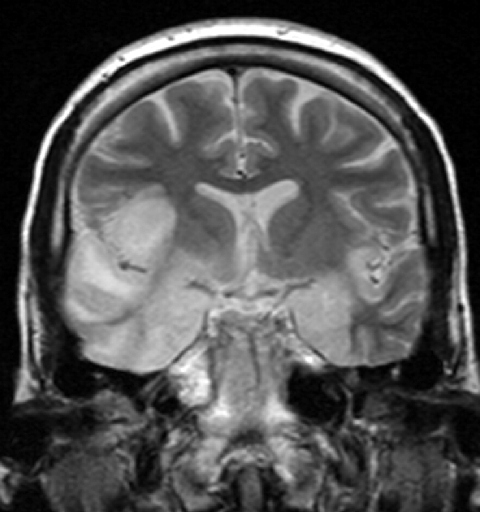
Encephalitis
Encephalitis is inflammation of the brain.[5] The severity can be variable with symptoms including reduction or alteration in consciousness, headache, fever, confusion, a stiff neck, and vomiting.[1][6] Complications may include seizures, hallucinations, trouble speaking, memory problems, and problems with hearing.[1]
Encephalitis
Seizures, trouble speaking, memory problems, problems hearing[1]
Weeks to months for recovery[1]
Herpes simplex, West Nile, rabies, Eastern equine, others[2]
Infection, autoimmune, certain medication, unknown[2]
Based on symptoms, supported by blood tests, medical imaging, analysis of cerebrospinal fluid[2]
Variable[1]
4.3 million (2015)[3]
150,000 (2015)[4]
Causes of encephalitis include viruses such as herpes simplex virus and rabies virus as well as bacteria, fungi, or parasites.[1][2] Other causes include autoimmune diseases and certain medications.[2] In many cases the cause remains unknown.[2] Risk factors include a weak immune system.[2] Diagnosis is typically based on symptoms and supported by blood tests, medical imaging, and analysis of cerebrospinal fluid.[2]
Certain types are preventable with vaccines.[5] Treatment may include antiviral medications (such as acyclovir), anticonvulsants, and corticosteroids.[1] Treatment generally takes place in hospital.[1] Some people require artificial respiration.[1] Once the immediate problem is under control, rehabilitation may be required.[2] In 2015, encephalitis was estimated to have affected 4.3 million people and resulted in 150,000 deaths worldwide.[3][4]
Signs and symptoms[edit]
Adults with encephalitis present with acute onset of fever, headache, confusion, and sometimes seizures. Younger children or infants may present with irritability, poor appetite and fever.[7] Neurological examinations usually reveal a drowsy or confused person. Stiff neck, due to the irritation of the meninges covering the brain, indicates that the patient has either meningitis or meningoencephalitis.[8]
Prevention[edit]
Vaccination is available against tick-borne[25] and Japanese encephalitis[26] and should be considered for at-risk individuals. Post-infectious encephalomyelitis complicating smallpox vaccination is avoidable, for all intents and purposes, as smallpox is nearly eradicated.[27] Contraindication to Pertussis immunization should be observed in patients with encephalitis.[28]
Prognosis[edit]
Identification of poor prognostic factors include cerebral edema, status epilepticus, and thrombocytopenia.[33] In contrast, a normal encephalogram at the early stages of diagnosis is associated with high rates of survival.[33]
Terminology[edit]
Encephalitis with meningitis is known as meningoencephalitis, while encephalitis with involvement of the spinal cord is known as encephalomyelitis.[2]
The word is from Ancient Greek ἐγκέφαλος, enképhalos 'brain',[36] composed of ἐν, en, 'in' and κεφαλή, kephalé, 'head', and the medical suffix -itis 'inflammation'.[37]